James St Clair-Erskine, 2nd Earl of Rosslyn facts for kids
Quick facts for kids
General The Right Honourable
The Earl of Rosslyn
|
|
|---|---|

The Earl of Rosslyn by James Sayers, 1788.
|
|
| Lord Keeper of the Privy Seal | |
| In office 10 June 1829 – 15 November 1830 |
|
| Monarch | |
| Prime Minister | The Duke of Wellington |
| Preceded by | The Lord Ellenborough |
| Succeeded by | The Lord Durham |
| Lord President of the Council | |
| In office 15 December 1834 – 8 April 1835 |
|
| Monarch | William IV |
| Prime Minister | Sir Robert Peel, Bt |
| Preceded by | The Marquess of Lansdowne |
| Succeeded by | The Marquess of Lansdowne |
| Member of the House of Lords Lord Temporal |
|
| In office 2 January 1805 – 18 January 1837 Hereditary Peerage |
|
| Preceded by | The 1st Earl of Rosslyn |
| Succeeded by | The 3rd Earl of Rosslyn |
| Personal details | |
| Born | 6 February 1762 |
| Died | 18 January 1837 (aged 74) |
| Nationality | British |
| Political party | |
| Spouse |
Harriet Bouverie
(m. 1790; died 1810) |
| Children | James St Clair-Erskine, 3rd Earl of Rosslyn |
| Parents | Sir Henry Erskine, 5th Baronet Janet Wedderburn |
| Relatives | Alexander Wedderburn, 1st Earl of Rosslyn (uncle) |
James St Clair-Erskine, 2nd Earl of Rosslyn (born February 6, 1762 – died January 18, 1837), was a Scottish soldier and politician. He was also known as Sir James Erskine, Bt, and later as Sir James St Clair-Erskine, Bt. He held important roles in the British government.
Contents
Early Life and Education
James St Clair-Erskine was the son of Lieutenant-General Sir Henry Erskine. His mother was Janet Wedderburn. His uncle, Alexander Wedderburn, was the 1st Earl of Rosslyn. The title of Earl of Rosslyn was set up so that James would inherit it.
James became the sixth Baronet in 1765 when he was just three years old. He went to school at Edinburgh High School and Eton. In 1778, he joined the army, starting his military career.
Military Career and Service
James St Clair-Erskine had a long and active military career.
- In 1782, he worked as an assistant Adjutant-General in Ireland.
- By 1793, he became the Adjutant-General. In this role, he served during the Siege of Toulon and in Corsica.
- In 1795, he was promoted to colonel. He also became an Aide-de-Camp to King George III.
- He continued to rise through the ranks, becoming a major-general in 1798.
- He was promoted to lieutenant-general in 1805 and finally to general in 1814.
In 1806, he was part of a special group sent to Lisbon. This mission led to Sir Arthur Wellesley (who later became the Duke of Wellington) being sent to the Peninsular War. James St Clair-Erskine also took part in the Battle of Copenhagen in Denmark.
Political Career and Public Service
James St Clair-Erskine was also very active in politics.
- He was a member of the House of Commons for Castle Rising from 1782 to 1784.
- He then represented Morpeth from 1784 to 1796.
- He started his political life as a Whig. He supported Edmund Burke and Charles James Fox.
- In 1789, he inherited the Rosslyn and Dysart estates. He then added "St Clair" to his name.
- In 1796, he was elected to represent the Dysart Burghs in Fife. This area was traditionally influenced by the St Clair family.
In January 1805, he inherited the title of Earl of Rosslyn from his uncle. By this time, he was considered a Tory. After the Napoleonic Wars, he continued his political work in the House of Lords.
- He served as Lord Privy Seal from 1829 to 1830. This was under the government of the Duke of Wellington.
- He was also Lord President of the Council under Sir Robert Peel from 1834 to 1835.
- In 1829, he became a member of the Privy Council.
Family Life
Lord Rosslyn married Harriet Elizabeth Bouverie in 1790. Harriet passed away in August 1810. James St Clair-Erskine remained a widower until his own death in January 1837, at the age of 74. His son, James, inherited his title.
Images for kids
 | Kyle Baker |
 | Joseph Yoakum |
 | Laura Wheeler Waring |
 | Henry Ossawa Tanner |



